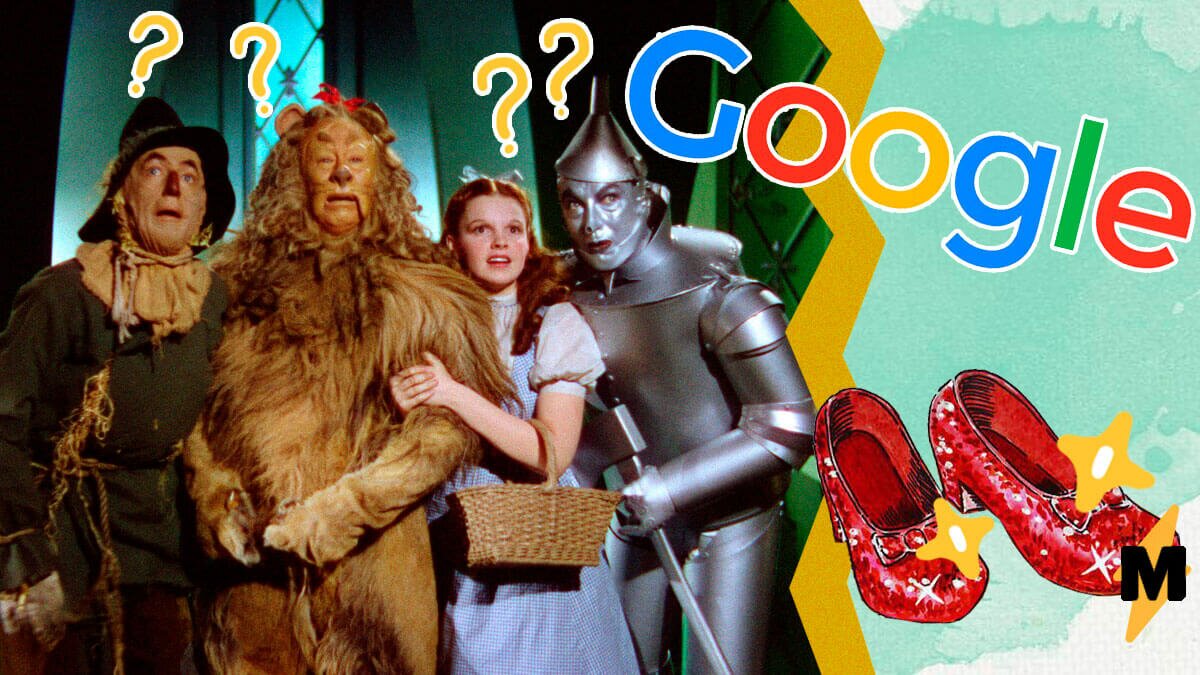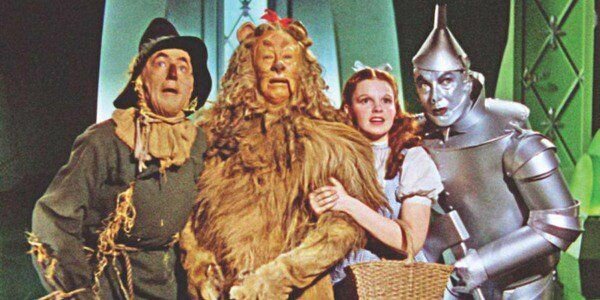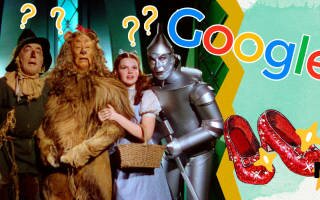Коктейль The Wizard of Oz Московские огни
Кажется, что мы уже не в Канзасе. Пасхалка от Google «Волшебник страны Оз» переносит людей, но не в сказку

В честь 80-летия фильма «Волшебник страны Оз» компания Google выпустила пасхалку, которую можно найти в поисковике по соответствующему запросу. Попытаться попасть в мир ведьм и жевунов можно с помощью красных туфелек, которые нужно отыскать на странице. Однако в результате вы (вслед за браузером) окажетесь не в сказке, а в очень немногоцветном прошлом.
В августе 1939 года на большие экраны вышел фантастический мюзикл американского режиссёра Виктора Флеминга «Волшебник страны Оз». Фильм стал самой известной и коммерчески успешной экранизацией романа «Удивительный Волшебник из Страны Оз» писателя Лаймена Фрэнка Баумана. Вы можете знать сюжет по пересказу Александра Волкова «Волшебник Изумрудного города».
Оригинальная сказка (и фильм тоже) рассказывает про сироту Дороти из Канзаса. Подхваченная сильным ураганом девочка вместе с домом и собакой Тото переносится в страну Оз и убивает Злую Ведьму Востока. В результате героиня по дороге из жёлтого кирпича отправляется в Изумрудный Город на поиски Волшебника, который сможет вернуть её домой. По пути она знакомится с пугалом Страшилой, Железным Дровосеком и Трусливым Львом.

Кадр из мюзикла «Волшебник страны Оз» 1939 года
Летом 2019 года картине исполнилось 80 лет, и корпорация Google решила отметить это событие в своём стиле. На одной из страниц поисковика появилась головокружительная (в прямом смысле) пасхалка, которую смогут найти лишь настоящие поклонники классического кино. Попробуйте догадаться самостоятельно или прочтите ниже, как найти отсылку.
Для начала нужно открыть стартовую страницу Google и ввести в строку поиска «Волшебник Страны Оз» или же Wizard of Oz — комбинация поможет достичь цели независимо от языка. Среди результатов появится много различных ссылок, но детективам стоит смотреть шире, а именно: в верхний правый угол — на маленькие блестящие туфельки в графе знаний (для удобства мы поместили их в жёлтый круг).

По сюжету, в подарок от Доброй Волшебницы Севера Дороти получила серебряные башмачки. Когда героиня трижды стучала пяткой о пятку, то могла переместиться куда угодно. После того как вы найдёте туфельки от Google, наденьте наушники, нажмите на изображение и наслаждайтесь телепортацией в прошлое.
Нет, мы не шутим, вот что произойдёт в окне браузера после клика (мобильной версии это тоже касается).

Пока картинка вращается, воспроизводится запись реплики Дороти из фильма: «Лучше дома места нет. Лучше дома места нет». Звучит она страшновато, но результат путешествия во времени пугает больше.

Чтобы вернуться к прежней версии страницы, достаточно ввести другой запрос в поисковик или нажать на серый торнадо, появившийся на месте красных туфелек. После приступа лёгкого головокружения и прослушивания криков Дороти «Быстрее! Быстрее!» вы вновь окажетесь в своей реальности.
Самое время провернуть этот фокус самостоятельно, начните со стартовой станицы Google. Если одной фразы для вас мало, после «Волшебника страны Оз» попробуйте ввести в строку поиска слова «Танос» (ищите в окне перчатку), Askew («кривой», работает только на английском) или Do a barrel roll.
Пока Google предлагает пользователям телепортироваться в прошлое, разработчики из Австралии помогают людям перенестись в аниме. Стать мультяшным и большеглазым помогает нейросеть, но результаты не всегда предсказуемы.
Устроить квест самостоятельно можно с помощью нового сервиса Spark AR от Facebook. Программа позволяет одиноким девушкам путать друзей и притворяться, будто у них есть бойфренды. Для этого нужны лишь руки, телефон и немного коварства.
The Wonderful Wizard of Oz
НАСТРОЙКИ.
СОДЕРЖАНИЕ.
СОДЕРЖАНИЕ

The Wonderful Wizard of Oz
Folklore, legends, myths and fairy tales have followed childhood through the ages, for every healthy youngster has a wholesome and instinctive love for stories fantastic, marvelous and manifestly unreal. The winged fairies of Grimm and Andersen have brought more happiness to childish hearts than all other human creations.
Yet the old time fairy tale, having served for generations, may now be classed as ‘historical’ in the children’s library; for the time has come for a series of newer ‘wonder tales’ in which the stereotyped genie, dwarf and fairy are eliminated, together with all the horrible and blood-curdling incidents devised by their authors to point a fearsome moral to each tale. Modern education includes morality; therefore the modern child seeks only entertainment in its wonder tales and gladly dispenses with all disagreeable incident.
Having this thought in mind, the story of ‘The Wonderful Wizard of Oz’ was written solely to please children of today. It aspires to being a modernized fairy tale, in which the wonderment and joy are retained and the heartaches and nightmares are left out.
Chicago, April, 1900.
Dorothy lived in the midst of the great Kansas prairies, with Uncle Henry, who was a farmer, and Aunt Em, who was the farmer’s wife. Their house was small, for the lumber to build it had to be carried by wagon many miles. There were four walls, a floor and a roof, which made one room; and this room contained a rusty looking cookstove, a cupboard for the dishes, a table, three or four chairs, and the beds. Uncle Henry and Aunt Em had a big bed in one corner, and Dorothy a little bed in another corner. There was no garret at all, and no cellar — except a small hole dug in the ground, called a cyclone cellar, where the family could go in case one of those great whirlwinds arose, mighty enough to crush any building in its path. It was reached by a trap door in the middle of the floor, from which a ladder led down into the small, dark hole.
When Dorothy stood in the doorway and looked around, she could see nothing but the great gray prairie on every side. Not a tree nor a house broke the broad sweep of flat country that reached to the edge of the sky in all directions. The sun had baked the plowed land into a gray mass, with little cracks running through it. Even the grass was not green, for the sun had burned the tops of the long blades until they were the same gray color to be seen everywhere. Once the house had been painted, but the sun blistered the paint and the rains washed it away, and now the house was as dull and gray as everything else.
When Aunt Em came there to live she was a young, pretty wife. The sun and wind had changed her, too. They had taken the sparkle from her eyes and left them a sober gray; they had taken the red from her cheeks and lips, and they were gray also. She was thin and gaunt, and never smiled now. When Dorothy, who was an orphan, first came to her, Aunt Em had been so startled by the child’s laughter that she would scream and press her hand upon her heart whenever Dorothy’s merry voice reached her ears; and she still looked at the little girl with wonder that she could find anything to laugh at.
Uncle Henry never laughed. He worked hard from morning till night and did not know what joy was. He was gray also, from his long beard to his rough boots, and he looked stern and solemn, and rarely spoke.
It was Toto that made Dorothy laugh, and saved her from growing as gray as her other surroundings. Toto was not gray; he was a little black dog, with long silky hair and small black eyes that twinkled merrily on either side of his funny, wee nose. Toto played all day long, and Dorothy played with him, and loved him dearly.
Today, however, they were not playing. Uncle Henry sat upon the doorstep and looked anxiously at the sky, which was even grayer than usual. Dorothy stood in the door with Toto in her arms, and looked at the sky too. Aunt Em was washing the dishes.
From the far north they heard a low wail of the wind, and Uncle Henry and Dorothy could see where the long grass bowed in waves before the coming storm. There now came a sharp whistling in the air from the south, and as they turned their eyes that way they saw ripples in the grass coming from that direction also.
Suddenly Uncle Henry stood up.
‘There’s a cyclone coming, Em,’ he called to his wife. ‘I’ll go look after the stock.’ Then he ran toward the sheds where the cows and horses were kept.
Aunt Em dropped her work and came to the door. One glance told her of the danger close at hand.
‘Quick, Dorothy!’ she screamed. ‘Run for the cellar!’
Toto jumped out of Dorothy’s arms and hid under the bed, and the girl started to get him. Aunt Em, badly frightened, threw open the trap door in the floor and climbed down the ladder into the small, dark hole. Dorothy caught Toto at last and started to follow her aunt. When she was halfway across the room there came a great shriek from the wind, and the house shook so hard that she lost her footing and sat down suddenly upon the floor.
Then a strange thing happened.
The house whirled around two or three times and rose slowly through the air. Dorothy felt as if she were going up in a balloon.
The north and south winds met where the house stood, and made it the exact center of the cyclone. In the middle of a cyclone the air is generally still, but the great pressure of the wind on every side of the house raised it up higher and higher, until it was at the very top of the cyclone; and there it remained and was carried miles and miles away as easily as you could carry a feather.
It was very dark, and the wind howled horribly around her, but Dorothy found she was riding quite easily. After the first few whirls around, and one other time when the house tipped badly, she felt as if she were being rocked gently, like a baby in a cradle.
Toto did not like it. He ran about the room, now here, now there, barking loudly; but Dorothy sat quite still on the floor and waited to see what would happen.
Once Toto got too near the open trap door, and fell in; and at first the little girl thought she had lost him. But soon she saw one of his ears sticking up through the hole, for the strong pressure of the air was keeping him up so that he could not fall. She crept to the hole, caught Toto by the ear, and dragged him into the room again, afterward closing the trap door so that no more accidents could happen.
Hour after hour passed away, and slowly Dorothy got over her fright; but she felt quite lonely, and the wind shrieked so loudly all about her that she nearly became deaf. At first she had wondered if she would be dashed to pieces when the house fell again; but as the hours passed and nothing terrible happened, she stopped worrying and resolved to wait calmly and see what the future would bring. At last she crawled over the swaying floor to her bed, and lay down upon it; and Toto followed and lay down beside her.
In spite of the swaying of the house and the wailing of the wind, Dorothy soon closed her eyes and fell fast asleep.
2. The Council with the Munchkins
She was awakened by a shock, so sudden and severe that if Dorothy had not been lying on the soft bed she might have been hurt. As it was, the jar made her catch her breath and wonder what had happened; and Toto put his cold little nose into her face and whined dismally. Dorothy sat up and noticed that the house was not moving; nor was it dark, for the bright sunshine came in at the window, flooding the little room. She sprang from her bed
Лаймен Фрэнк Баум «Удивительный волшебник из страны Оз»
Удивительный волшебник из страны Оз
The Wonderful Wizard of Oz
Другие названия: Великий чародей страны Оз; Мудрец из страны Оз; Волшебник страны Оз; Глупый волшебник
Сказка, 1900 год; цикл «Страна Оз»
Язык написания: английский
Перевод на русский: Э. Плегунова (Удивительный волшебник из Страны Оз), 1991 — 1 изд. О. Варшавер, Т. Тульчинская, Д. Псурцев (Великий чародей страны Оз), 1991 — 2 изд. И. Разумовская, С. Самострелова (Удивительный волшебник из страны Оз), 1992 — 1 изд. С. Белов (Удивительный волшебник из страны Оз), 1992 — 9 изд. А. Боровиков, Т. Муратова (Мудрец из страны Оз), 1992 — 1 изд. Д. Толстоба (Глупый волшебник), 1997 — 1 изд. Н. Миронова (Волшебник из страны Оз), 2008 — 2 изд. О. Степкина (Волшебник страны Оз), 2011 — 1 изд. Д. Селиверстова (Волшебник страны Оз), 2011 — 1 изд. Е. Карганова (Волшебник страны Оз), 2013 — 1 изд. А. Петрова (Волшебник из страны Оз), 2015 — 1 изд. Перевод на украинский: М. Пинчевский (Чарівник країни Оз), 1992 — 2 изд. А. Саган (Дивовижний чарівник країни Оз), 2006 — 1 изд. Перевод на польский: Б. Шиманек (Czarnoksiężnik z Krainy Oz), 2015 — 1 изд.
- Жанры/поджанры: Сказка/Притча
- Общие характеристики: Приключенческое
- Место действия: Наш мир (Земля)( Америка( Северная ) ) | Параллельный мир/вселенная
- Время действия: 20 век
- Сюжетные ходы: Путешествие к особой цели | Становление/взросление героя
- Линейность сюжета: Линейный
- Возраст читателя: Детская литература
Классическая сказка Л.Ф. Баума о девочке Дороти, которую страшный ураган унёс в загадочную страну Оз.
Иллюстратор первого издания: W. W. Denslow. Издатель: George M. Hill. Позже переиздано другими издателями под названиями «The New Wizard of Oz» и «The Wizard of Oz» с небольшими изменениями в тексте.
— «Волшебник страны Оз» / «The Wizard of Oz» 1939, США, реж: Виктор Флеминг, Мервин ЛеРой, Ричард Торп, Кинг Видор
— «Виз» / «The Wiz» 1978, США, реж: Сидни Люмет
Издания на иностранных языках:
roman8567, 3 марта 2013 г.
Как-то несправедливо получается: на «Волшебника страны Оз» написан только один отзыв, а на «Волшебника Изумрудного города», который является пересказом этой книги (а во многих местах даже скорее вольным переводом) – целых 62.
Недавно слушал аудиокнигу «The Wizard of Oz». Не думал, что получу такое большое удовольствие от детской сказки. Даже гнусавый американский выговор чтеца совсем не вызывал раздражения, а, наоборот, делал высказывания сказочных героев более прикольными. Восхищаюсь беспредельной фантазией автора.
Я долго не мог определиться, кто является моим любимым англоязычным писателем. Сэлинджер? Пристли? Уоррен? А вот теперь точно знаю, что это Лаймен Фрэнк Баум. Думаю, что и вышеназванные писатели на меня бы за это не обиделись.
dao8571428, 26 июня 2012 г.
чудесная детская история.
читать интересно и малым и большим. перечитывать — одно удовольствие.
если кто-то хочет подарить своему чаду эту книгу — покупайте с иллюстрациями! обязательно! для меня и сейчас — когда сажусь перечитать — чтение превращается в волшебное приключение. эти рисунки вкупе с самой сказкой неоценимо обогатят мир вашего малыша.
ЗЫ: когда писал отзыв, улыбка с моего лица не исчезала 🙂
witkowsky, 8 января 2015 г.
Проще простого: это величайшая сказка ХХ века. И все прочие ей ни разу не конкуренты. Потому, что помимо 14 (с дополнениями) книг самого Баума, считая с ними вместе, за 1900-1998 годы создано в общей сложности 40 книг «КАНОНА СТРАНЫ ОЗ». А к ним — выходящие по сей день многие сотни продолжений и вариаций той же темы. Причем среди этих «продолжений» американцы с удовольствием размещают все книги А. Волкова — они, кстати, переведены и на английский, и на многие другие языки. А ведь к этой теме англофоны ревнивы. да и правильно, что ревнивы, Лучше этого сюжета нет ничего.
Секрет успеха прост. Баум, создавая свою страну, наделил тех, кто живет в ней, даром вечной юности — кажется, впервые за всю мировую литературу. В итоге и Страшила, и Железный Дровосек (плевать, что он вообще-то жестяной) и многие другие герои могут жить там вечно и не стареть, и вот уже второе столетие они вместе с Трусливым Львом и Голодным Тигром — и со Слоном Кобампо — живут и будут жить, радуя читателей в возрасте приблизительно от шести и до ста лет. Перехвалить этот великолепный миф нельзя. Если уж более чем взрослые писатели Стивен Кинг и Филип Хосе Фармер оскоромились написать по книге про Страну Оз — значит, мир убедился, что стал сам он лучше от того, что не особо-то тогда еще известный писатель френк Баум посмотрел на каталожный ящик с надписью « O-Z». И он увидел дорогу в волшебную страну, в Страну Оз. И была эта дорога — из желтого кирпича.
Да, читатели. Кажется, мы уже не в Канзасе.
NightMiRe, 26 июля 2016 г.
Любимая сказка детства. Вот только читана она была мной в пересказе Волкова. Конечно я и в детстве слышал, что есть такая “Страна ОЗ”, а “Волшебник Изумродного Города” лишь пересказ, но в силу возраста разыскать оригинал не представлялось возможным. И вот сейчас, случайно натолкнувшись на эту замечательную сказку, мне захотелось сравнить Баума с Волковым, тем более что у последнего “продолжения” были всё-таки самостоятельно написанными (хотя как самостоятельно. начал читать вторую книгу Баума и вот уже живительный порошок. ), а о “продолжениях” Баума я не имею не малейшего представления.
Итак, у Волкова более приятный слог, читается не в пример легче чем у Баума, оригинал похоже рассчитан на детей более младшего возраста. Добавлены главы с людоедом, наводнение, послесловие, но почему то вырезаны предыстория появления золотой шапки и город фарфоровых человечков. Некоторые мелкие детали непонятно зачем изменены – например: после того как девочка и компания вышли из изумродного города, Дороти удивляется почему её платье подаренное во дворце из зеленого стало белым, а Элли удивляется произошедшему с ленточкой на шее тотошки, а Гудвин предстает перед дровосеком в образе морской девы, а не феи с крылышками. В таких деталях и кроется, на мой взгляд, главный недостаток книги, потому что в некоторых местах они просто напросто путают причинно следственные связи. Например у Волкова добрая волшебница говорит Элли что она вернется домой только после того как исполнит заветные желания троих живых существ. То есть получается Элли помогает Страшиле, Дровосеку и Льву только из меркантильных интересов? В оригинале она этого не знала и помогала друзьям по доброте душевной. Дороти не знала что злая волшебница боиться воды и убила её случайно, а Элли знала о боязни ею воды и специально поливала пол из ведра, да еще и вела пропаганду среди мигунов, подталкивая их к убийству Гингемы. В некоторых местах эти детали просто дурацкие: – Ха-ха-ха! – восхитился Тотошка, увидев в углу свёрток грязного платья. – Оказывается, Бастинда была не крепче тех снежных баб, каких у нас мальчишки лепят зимой в Канзасе. В пустыне лепят снежных баб? Сомневаюсь, хотя википедия говорит, что -5 зимой у них все же бывает.
Что читать вашему ребенку? Наверно и то и то! Ведь продолжения у Волкова и Баума разные, а сказок много не бывает!
P.S. Прискорбно, что Волков переиздается до сих пор, а Баум (если верить Фантлабу) после 1993-го года целиком не издавался.
Paganist, 16 июля 2015 г.
Писать о «Волшебнике страны Оз», абстрагируясь от хорошо знакомой и любимой книге детства «Волшебник Изумрудного города» Волкова, нелегко. Сюжет известен наперёд и никаких сюрпризов не содержит. Тем не менее, подковырка сокрыта в жанре: Баум всё же написал классическую авторскую сказку, в то время как Волков всё же расширил оригинал до сказочной повести, где больше описаний и прочих «заморочек» художественной литературы.
Страна Оз — огромный полигон для дальнейших литературных изысканий и одновременно милая сказка со всеми необходимыми её атрибутами: волшебством, необычными существами, квестами и моралью. Кроме того, читается легко, на одном дыхании. Причём остаётся некое притягательное послевкусие, что, несомненно, является почерком настоящего рассказчика сказок. Сразу же захотелось читать другие произведения цикла. Уж больно заманчивый мир создал Баум.
Velary, 1 сентября 2016 г.
Как и большинство, читала в невольном сравнении с «Волшебником Изумрудного города» и, как и многие, сочла переложение Волкова гораздо более удачным. Но сейчас — только о сказке Баума.
Она мрачная. Напомнила мне Братьев Гримм, только без их атмосферности. Хмурая тётка, снятые с трупа башмачки, кровавые волчьи тела с отрубленными головами. Брр!
Она абстрактная. Герои хрестоматийны, а второстепенные персонажи и вовсе безликие функции. Диалогов мало и они исключительно «по делу», коротко и ясно.
Она аляповатая. Отдельные эпизоды, зачем-то сшитые вместе. Не складывается цельная картина, не прослеживается связь.
Она «влобная». Это хорошо — так и запишем, «хорошо», а это плохо — прямо и скажем «плохо».
Словом, спасибо за наше счастливое детство!
Читать онлайн «The Wonderful Wizard of Oz» автора Баум Лаймен Фрэнк — RuLit — Страница 1
The Wonderful Wizard of Oz
Folklore, legends, myths and fairy tales have followed childhood through the ages, for every healthy youngster has a wholesome and instinctive love for stories fantastic, marvelous and manifestly unreal. The winged fairies of Grimm and Andersen have brought more happiness to childish hearts than all other human creations.
Yet the old time fairy tale, having served for generations, may now be classed as «historical» in the children’s library; for the time has come for a series of newer «wonder tales» in which the stereotyped genie, dwarf and fairy are eliminated, together with all the horrible and blood-curdling incidents devised by their authors to point a fearsome moral to each tale. Modern education includes morality; therefore the modern child seeks only entertainment in its wonder tales and gladly dispenses with all disagreeable incident.
Having this thought in mind, the story of «The Wonderful Wizard of Oz» was written solely to please children of today. It aspires to being a modernized fairy tale, in which the wonderment and joy are retained and the heartaches and nightmares are left out.
Chicago, April, 1900.
Dorothy lived in the midst of the great Kansas prairies, with Uncle Henry, who was a farmer, and Aunt Em, who was the farmer’s wife. Their house was small, for the lumber to build it had to be carried by wagon many miles. There were four walls, a floor and a roof, which made one room; and this room contained a rusty looking cookstove, a cupboard for the dishes, a table, three or four chairs, and the beds. Uncle Henry and Aunt Em had a big bed in one corner, and Dorothy a little bed in another corner. There was no garret at all, and no cellar � except a small hole dug in the ground, called a cyclone cellar, where the family could go in case one of those great whirlwinds arose, mighty enough to crush any building in its path. It was reached by a trap door in the middle of the floor, from which a ladder led down into the small, dark hole.
When Dorothy stood in the doorway and looked around, she could see nothing but the great gray prairie on every side. Not a tree nor a house broke the broad sweep of flat country that reached to the edge of the sky in all directions. The sun had baked the plowed land into a gray mass, with little cracks running through it. Even the grass was not green, for the sun had burned the tops of the long blades until they were the same gray color to be seen everywhere. Once the house had been painted, but the sun blistered the paint and the rains washed it away, and now the house was as dull and gray as everything else.
When Aunt Em came there to live she was a young, pretty wife. The sun and wind had changed her, too. They had taken the sparkle from her eyes and left them a sober gray; they had taken the red from her cheeks and lips, and they were gray also. She was thin and gaunt, and never smiled now. When Dorothy, who was an orphan, first came to her, Aunt Em had been so startled by the child’s laughter that she would scream and press her hand upon her heart whenever Dorothy’s merry voice reached her ears; and she still looked at the little girl with wonder that she could find anything to laugh at.
Uncle Henry never laughed. He worked hard from morning till night and did not know what joy was. He was gray also, from his long beard to his rough boots, and he looked stern and solemn, and rarely spoke.
It was Toto that made Dorothy laugh, and saved her from growing as gray as her other surroundings. Toto was not gray; he was a little black dog, with long silky hair and small black eyes that twinkled merrily on either side of his funny, wee nose. Toto played all day long, and Dorothy played with him, and loved him dearly.
Today, however, they were not playing. Uncle Henry sat upon the doorstep and looked anxiously at the sky, which was even grayer than usual. Dorothy stood in the door with Toto in her arms, and looked at the sky too. Aunt Em was washing the dishes.
From the far north they heard a low wail of the wind, and Uncle Henry and Dorothy could see where the long grass bowed in waves before the coming storm. There now came a sharp whistling in the air from the south, and as they turned their eyes that way they saw ripples in the grass coming from that direction also.
Suddenly Uncle Henry stood up.
«There’s a cyclone coming, Em,» he called to his wife. «I’ll go look after the stock.» Then he ran toward the sheds where the cows and horses were kept.
Aunt Em dropped her work and came to the door. One glance told her of the danger close at hand.
«Quick, Dorothy!» she screamed. «Run for the cellar!»
Toto jumped out of Dorothy’s arms and hid under the bed, and the girl started to get him. Aunt Em, badly frightened, threw open the trap door in the floor and climbed down the ladder into the small, dark hole. Dorothy caught Toto at last and started to follow her aunt. When she was halfway across the room there came a great shriek from the wind, and the house shook so hard that she lost her footing and sat down suddenly upon the floor.
Then a strange thing happened.
The house whirled around two or three times and rose slowly through the air. Dorothy felt as if she were going up in a balloon.
The north and south winds met where the house stood, and made it the exact center of the cyclone. In the middle of a cyclone the air is generally still, but the great pressure of the wind on every side of the house raised it up higher and higher, until it was at the very top of the cyclone; and there it remained and was carried miles and miles away as easily as you could carry a feather.
It was very dark, and the wind howled horribly around her, but Dorothy found she was riding quite easily. After the first few whirls around, and one other time when the house tipped badly, she felt as if she were being rocked gently, like a baby in a cradle.
Toto did not like it. He ran about the room, now here, now there, barking loudly; but Dorothy sat quite still on the floor and waited to see what would happen.
Once Toto got too near the open trap door, and fell in; and at first the little girl thought she had lost him. But soon she saw one of his ears sticking up through the hole, for the strong pressure of the air was keeping him up so that he could not fall. She crept to the hole, caught Toto by the ear, and dragged him into the room again, afterward closing the trap door so that no more accidents could happen.
Hour after hour passed away, and slowly Dorothy got over her fright; but she felt quite lonely, and the wind shrieked so loudly all about her that she nearly became deaf. At first she had wondered if she would be dashed to pieces when the house fell again; but as the hours passed and nothing terrible happened, she stopped worrying and resolved to wait calmly and see what the future would bring. At last she crawled over the swaying floor to her bed, and lay down upon it; and Toto followed and lay down beside her.
In spite of the swaying of the house and the wailing of the wind, Dorothy soon closed her eyes and fell fast asleep.
2. The Council with the Munchkins
She was awakened by a shock, so sudden and severe that if Dorothy had not been lying on the soft bed she might have been hurt. As it was, the jar made her catch her breath and wonder what had happened; and Toto put his cold little nose into her face and whined dismally. Dorothy sat up and noticed that the house was not moving; nor was it dark, for the bright sunshine came in at the window, flooding the little room. She sprang from her bed and with Toto at her heels ran and opened the door.
The little girl gave a cry of amazement and looked about her, her eyes growing bigger and bigger at the wonderful sights she saw.
The cyclone had set the house down very gently � for a cyclone � in the midst of a country of marvelous beauty. There were lovely patches of greensward all about, with stately trees bearing rich and luscious fruits. Banks of gorgeous flowers were on every hand, and birds with rare and brilliant plumage sang and fluttered in the trees and bushes. A little way off was a small brook, rushing and sparkling along between green banks, and murmuring in a voice very grateful to a little girl who had lived so long on the dry, gray prairies.














